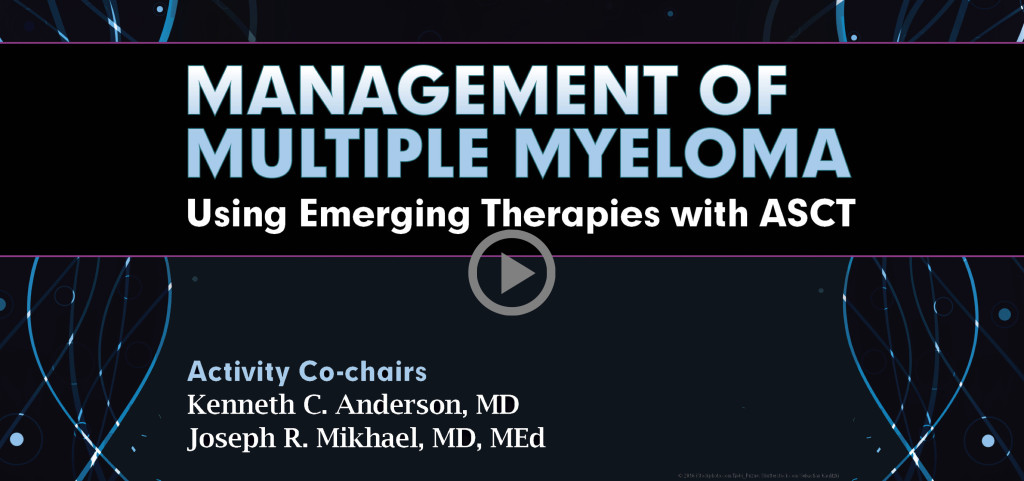Click the “Start Activity” button to indicate you have reviewed the CME information for this activity.
Activity Chairs
Kenneth C. Anderson, MD
Kraft Family Professor of Medicine, Harvard Medical School
Director, Jerome Lipper Multiple Myeloma Center and
LeBow Institute for Myeloma Therapeutics
Dana-Farber Cancer Institute
Boston, MA
Joseph R. Mikhael, MD, MEd, FRCPC, FACP
Professor of Medicine, Mayo College of Medicine
Associate Dean, Mayo School of Graduate Medical Education
Deputy Director – Education, Mayo Clinic Cancer Center
Associate Medical Director, Department of Development
Mayo Clinic in Arizona
Scottsdale, AZ
Release date: June 1, 2016
Expiration date: June 1, 2017
Browser Requirements
Firefox does not support some of the content in this activity. Please use one of the following browsers:
Internet Explorer 9 or later
Safari 5.1 or later
Google Chrome 17 or later
CME and Support Information
This continuing medical education activity is provided by The Medical College of Wisconsin. Collaborative Partner: Vindico Medical Education.
This activity is supported by educational grants from Janssen Biotech, Inc., administered by Janssen Scientific Affairs, LLC; Spectrum Pharmaceuticals, Inc.; and Takeda Oncology.
Program Overview
Multiple myeloma (MM) management has undergone profound changes in the past few decades, this is largely due to advances in understanding the disease biology and the development of new therapeutic options. However, this progress has also led to an increasingly complex treatment environment. Numerous questions remain, particularly in the transplant setting, such as the role of high-dose chemotherapy, the use of continuous/maintenance therapy, and the best treatment sequence for a patient with multiple myeloma.
In this CME activity, leading experts in multiple myeloma will review changes in the treatment paradigm, optimal patient selection for transplant, and data from recent clinical trials. They will also provide insight into new strategies for individualized management, the role of early versus late transplant, and how to incorporate novel therapies into clinical practice.
Learning Objectives
Upon successful completion of this educational activity, participants should be better able to:
- Review the eligibility criteria for stem cell transplant in patients with MM in both the frontline and relapse/refractory settings.
- Apply clinical evidence for optimal induction, conditioning, and consolidation strategies in patients with MM undergoing stem cell transplant.
- Utilize effective maintenance therapy in patients with MM who have completed stem cell transplant.
Target Audience
The intended audience for this activity is hematologists, oncologists, bone marrow transplant specialists, and other health care professionals who provide care for patients with multiple myeloma.
Accreditation Statement
The Medical College of Wisconsin is accredited by the Accreditation Council for Continuing Medical Education to provide continuing medical education for physicians.
AMA Credit Designation
The Medical College of Wisconsin designates this enduring material for a maximum of 1.0 AMA PRA Category 1 Credit™. Physicians should claim only the credit commensurate with the extent of their participation in the activity.
The Medical College of Wisconsin designates this activity for up to 1.0 hours of participation for continuing education for allied health professionals.
This enduring material is approved for 1 year from the date of original release, June 1, 2016 to June 1, 2017.
Faculty and Planner Disclosures
In accordance with the Accreditation Council for Continuing Medical Education’s Standards for Commercial Support, all CME providers are required to disclose to the activity audience the relevant financial relationships of the planners, teachers, and authors involved in the development of CME content. An individual has a relevant financial relationship if he or she has a financial relationship in any amount occurring in the last 12 months with a commercial interest whose products or services are discussed in the CME activity content over which the individual has control. Relationship information appears below:
Kenneth C. Anderson, MD, discloses that he has been on the Advisory Board for Celgene, Gilead, and Millennium. He also is a Scientific Founder for Acetylon, C4 Therapeutics, and OncoPep.
Joseph R. Mikhael, MD, MEd, FRCPC, FACP, discloses that he has received Institutional Research Funding (Clinical Trials) from AbbVie, Celgene, Onyx, and Sanofi.
The educational content of this program has been peer reviewed by The Medical College of Wisconsin.
The Medical College of Wisconsin, Carden Jennings Publishing, and Vindico Medical Education report the following relationship(s): No relevant financial relationships to disclose.
Signed disclosures are on file at The Medical College of Wisconsin.
Unlabeled and Investigational Usage
The audience is advised that this continuing education activity may contain references to unlabeled uses of FDA-approved products or to products not approved by the FDA for use in the United States. The faculty members have been made aware of their obligation to disclose such usage.
Disclaimer
The material presented at or in any Medical College of Wisconsin, Vindico Medical Education, or Carden Jennnings Publishing Company, Ltd, continuing education activity does not necessarily reflect the views and opinions of Medical College of Wisconsin, or Vindico Medical Education, or Carden Jennnings Publishing. Neither Medical College of Wisconsin, or Vindico Medical Education, or Carden Jennnings Publishing, nor the faculty endorse or recommend any techniques, commercial products, or manufacturers. The faculty/authors may discuss the use of materials and/or products that have not yet been approved by the U.S. Food and Drug Administration. All readers and continuing education participants should verify all information before treating patients or utilizing any product.
Click the “Start Activity” button to indicate you have reviewed the CME information for this activity.

